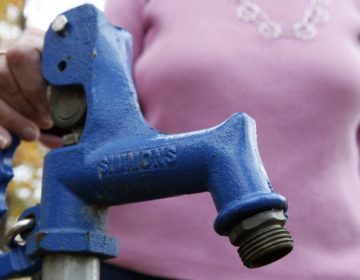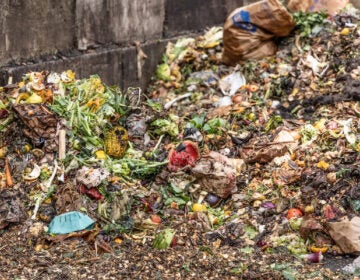Delaware residents impacted by pollution hope new legislation offers relief
July 8, 2025
This story is part of the WHYY News Climate Desk, bringing you news and solutions for our changing region.
From the Poconos to the Jersey Shore to the mouth of the Delaware Bay, what do you want to know about climate change? What would you like us to cover? Get in touch.
Clayton Joyce has one word to describe his experience living near the Croda chemical plant in New Castle, Delaware: “depressing.”
Joyce has resided near Croda Inc.’s Atlas Point plant, which sits at the base of the Delaware Memorial Bridge, for almost three decades.
He only drinks bottled water from the supermarket because the water from his taps has an earthy taste. Sometimes, Joyce wakes in the middle of the night to unusual smells in the air or a metallic taste in his mouth.
“You just know it’s wrong — like a burnt tire,” he said. “You just know it’s off when you smell it, because it hits you like a ton of bricks.”
Over the years, Croda’s facility has released cancer-causing ethylene oxide, a flammable gas, into the air. Most notably, the chemical manufacturer was fined following a 2018 incident that resulted in the release of nearly 2,700 pounds of the carcinogen. The incident closed the Delaware Memorial Bridge for seven hours, forcing residents to shelter in their homes.
Joyce said he’s concerned about the long-term health consequences for his family, and they have considered relocating when financially viable.
But he hopes new state legislation will make a difference in his community and other areas in Delaware hardest hit by pollution.
Higher fines for polluters
State lawmakers passed a bill last week that aims to hold polluters accountable by increasing violation fines and by directing the funds back to communities directly affected by the environmental offenses. The bill now awaits a signature from Gov. Matt Meyer.
“I hope it will open up more revenue for us to take evasive actions — clean up the carbon footprint, or the ‘death footprint,’” Joyce said. “At least use the money to buy filters. At these schools, you need to get some water fountain filters, air filters for the ventilation systems.”
The new legislation, sponsored by state Rep. Larry Lambert, increases daily fines associated with various environmental violations — one of which had not been raised since 1973 — by as much as $30,000 in some cases.
Environmentalists are hopeful the higher fines will hold chronic violators accountable. The Delaware City Refinery in New Castle County, for example, has received more than 50 violations in the past 10 years. In 2019, the facility had a backlog of violations that hadn’t been paid in years — ultimately settling with the state for $950,000.
Environmental groups have accused the state of allowing polluters to avoid fines.
“Fines were used as the carrot to get polluters back into compliance with their permits,” said Dustyn Thompson of the Sierra Club in Delaware.
He argues, historically, it was not worth it for the state’s Department of Natural Resources and Environmental Control to issue fines because the time and costs associated with the appeals process were often higher than the fines.
“Because the fines were so low, DNREC often would rather get them to come back into compliance, albeit usually for a short time, than to go after them for something that at the end of the day is probably going to cost DNREC more money [during an appeal] than they would have gotten under the old fine structure,” Thompson said.
He said raising the fines will help motivate the state to take stronger enforcement actions.
Some members of the business community say the legislation will have long-term implications, however.
“Our members have made and continue to make meaningful investments to responsibly manage air, water, and environmental impacts,” said the Delaware State Chamber of Commerce in a statement.
“Yet, this law imposes steep fines — up to $40,000 per day, without clear justification for such increases,” the statement reads. “We are especially concerned that this will signal to the insurance industry a higher risk of substantial penalties, elevating liability and leading to higher insurance costs for everyone.”
Supporting communities impacted by pollution
The legislation does more than increase penalties. The bill also aims to give DNREC more power to enforce violations, allowing the agency to appeal decisions by the Environmental Appeals Board relating to chronic violator status.
The legislation would direct the funds raised by fines to communities within a two-mile radius of the polluter. Currently, dollars collected from facilities that violate their environmental permits go to the state’s Environmental Project Fund. The funding pays for environmental initiatives throughout the state, but not necessarily in communities directly affected by the polluters who paid the fines.
“You had larger nonprofits, sometimes nonprofits with a direct link to the polluters themselves, accessing those funds to do projects — often greenwashing projects — way far away from the communities that have been impacted by the violations that got that money into that fund,” Thompson said.
Residents, such as Ron D. Handy Sr., say the community surrounding Croda has not benefited from the fund. Handy has lived a quarter mile of the Croda facility for 16 years, and is fearful of leaks and the long-term health effects of exposure. He said he hopes the new legislation will help his community secure funding for regular air quality monitoring — something they’ve been pushing for years.
“It’s just time for all communities to be treated equally,” Handy said.
Maria Payan, executive director of the Sussex Health and Environmental Network, said the new legislation is long overdue for communities impacted by large industries. The environmental advocate has fought for clean water in Sussex County, where private wells have been contaminated by various industries, such as the Mountaire Farms chicken plant, which led to a legal settlement.
“We need to have a fund to at least get people reverse osmosis [water treatment] systems … so that they can have some type of clean water to even brush their teeth with or to cook with,” Payan said.
Thompson is urging lawmakers to take further action that would prevent repeat offenders from receiving new permits.
“We have seen time and time again large industries violate their permits, break regulations and very little happens,” he said.

Get daily updates from WHYY News!
WHYY is your source for fact-based, in-depth journalism and information. As a nonprofit organization, we rely on financial support from readers like you. Please give today.
Search
RECENT PRESS RELEASES
Related Post






